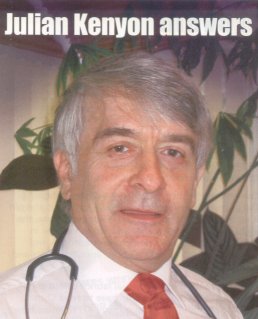Originally published in May-June 2004 icon

Dr Kenyon can also be reached directly, via www.doveclinic.com
Telephone: 020 7486 5588 or 01962 718 000
May & June 2004
Q:
I am 56 and a year ago was diagnosed with breast cancer with small volume liver metastases which is not hormonally receptive. Twelve months on after a lumpectomy, chemotherapy, radiotherapy and a self imposed no dairy, meat, alcohol or caffeine diet and lots of juicing and water plus various recommended vitamins and minerals, scans have shown me to have "complete disease response". I’m now back at my previous weight, my hair has returned, and I’m very happy.My question is because my cancer was not hormone receptive, does the "no dairy" rule apply to me? I used to like cheese and if your experts think that I could go back to eating it, this would be very good news.
A:
The no dairy rule is applicable to you and others with non-hormonally responsive breast cancer because milk contains high amounts of Insulin-like Growth Factor No. 1, which is an important growth factor in any cancer. Also animal products form highly acidic residues in the body and encourage tissue to become acidic and therefore lacking in oxygen. This encourages the cancer process.
Q:
I have testicular cancer and recently had surgery to remove my left testicle. There is some spread of cancer to the para-aortic lymph notes and I have just had my 2nd session chemo. Quite frankly I am very scared. There’s a long history of cancer in the family and I have a phobia about the disease. The diagnosis came during a period of high work stress and I have virtually had a nervous breakdown over it all. I have details of an anti-candida diet but the whole situation is confusing as different books recommend different diets.I desperately want to beat this disease both physically and mentally but I’m in such a turm at the moment that I can’t get my mind around it. Is there anything you could advise?
A:
It is confusing being given various diets from various books. The truth is that there are no black and white rules but going to an experienced doctor or practitioner who can test in this area is the most helpful thing you can do.
That will help ease much of the turmoil in your mind and if you can establish a clear mind and a clear way forward then you are generally much stronger and there is good evidence to show that this state of mind is associated with better outcomes.
Q:
In February 2002 I was diagnosed with ovarian cancer and had surgery followed by nine cycles of carboplatin chemo which finished in November 2002 when I was declared cancer free. However this year I was told that the CA125 marker was going up again so it was decided to restart chemo, using carboplatain and taxol. I had a severe reaction the taxol and decided that I would not have an more chemo and go for quality rather than quantity. However my oncologist persuaded me to try an oral chemo (Treosulfan) which has few or no side effects.When the cancer returned I decided to look into alternative therapies and remedies. I gave up dairy food, red meat, caffeine, sugar and processed food and started taking Revenol and Maximol daily. I feel a whole lot better and my husband and friends say I look better I informed my oncologist about my diet and the supplements and he just said "placebo". I wanted to ask you about taking extra vitamin C or omega 3. Also what about laetrile?
A:
Oncologists often have a negative approach to diet, simply because these approaches are not adequately researched but they never will be because they are not patentable treatments. The remarks that these are "placebo" is, in my view from 30 years experiences in this area and having seen many patients who have done well on these approaches (patients such as you) downright dismissive.
Essentially you need to be supporting your cell mediated immune function and having a programme designed for you specitcally in your current situation. Therefore you need expert help. This is not an easy area as recurrent ovarian cancer is not easy to treat.